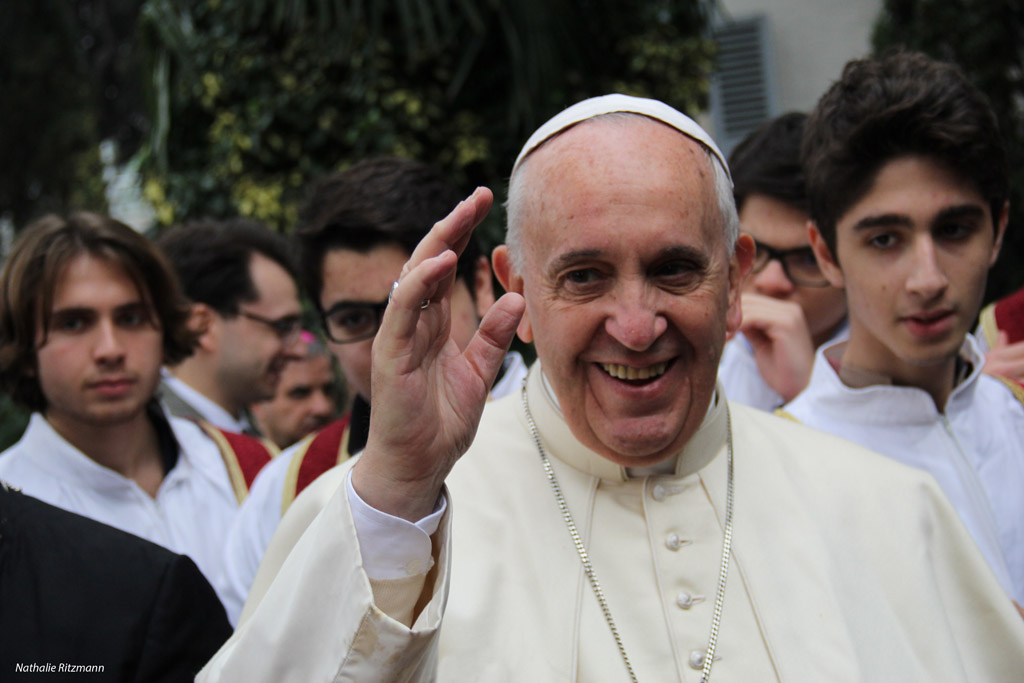|
The Pope in Turkey: benefits and limits of dialogue For his part, the Pope focused on the duty of governments to protect religious liberty by giving "the same rights" to all citizens whatever their denomination. On this score, Turkey falls short, as Christian Churches in the country are not granted official legal status. The Pope called on Turkey to set an example of "inter-religious dialogue" in order to stem the fundamentalist threat on its borders. By Sébastien de Courtois ISTANBUL—The dominant theme and format of the Pope's Nov. 28-30 pastoral visit to Turkey was dialogue—with Turkish President Recep Tayyip Erdogan; with Muslim leaders; with the country’s Catholic community; and finally with Ecumenical Patriarch Bartholomew I of Constantinople, spiritual leader of the Orthodox world. In a joint statement to the press, the Turkish president said his meeting with Pope Francis presented an "image of hope for the entire world." For the Pontiff, that hope resides in what he suggested is Turkey’s highest calling as a bridge between civilizations, between East and West
As it stands, the role of Turkey—where Sunni Muslims are in the majority—is ambivalent at best. Erdogan denounced “discrimination and hatred” of Muslims in Europe, but he was notably silent on Sunni extremism in Syria and Iraq, whose excesses Turkey has played a role in allowing if not encouraging. He claimed that “the relationship between Islam and terror is the result of Islamophobia.” There was no mention of the persecution of Christians, while the president lumped Syria and Israel together as "terrorist" states. For his part, the Pope focused on the duty of governments to protect religious liberty by giving "the same rights" to all citizens whatever their denomination. On this score, Turkey falls short, as Christian Churches in the country are not granted official legal status. The Pope called on Turkey to set an example of "interreligious dialogue" in order to stem the fundamentalist threat on its borders. "A greater liberty, a more visible recognition could give the Christians signs of hope and of a better future, signs which would encourage them not to think permanently of emigration to Europe and the West,” said Father Alberto Ambrosio, a Dominican based in Istanbul. He told Aid to the Church in Need that “there are still Christians who are leaving Turkey because they do not have prospects of a secure future." On his return flight to Rome, the Pontiff told reporters he had told President Erdogan that Muslim leaders should issue a global condemnation of terrorism: "I told the President it would be nice to see all Islamic leaders, political, religious or academic, make a clear statement and condemn this, because this would help the majority of the Muslim population," he added. The Pope visited the famous Blue Mosque, where he spent a few moments in prayer. His next stop was the ancient basilica Hagia Sophia, a former Greek Orthodox place of worship which had been turned into a mosque before becoming a museum. In 1967, Pope Paul VI sparked protests when he kneeled down in prayer inside Hagia Sophia, the former mosque and present-day museum. The day ended with Mass in the Catholic Cathedral of the Holy Spirit, followed by a meeting with Christian refugees from Iraq and Syria, and an encounter with the leaders of other Christian denominations in Turkey. The Pope concluded the evening joining in an ecumenical prayer Patriarch Bartholomew. The two leaders signed a declaration signalling a commitment to continue vigorous efforts aimed at overcoming the obstacles which have divided the Catholic and Orthodox Churches since 1054. The Pope stressed that "the Catholic Church does not wish to impose any demand other than the profession of a common faith.” Pope Francis and the Patriarch appeared hand-in-hand and embraced on the balcony of the Phanar, the seat of the Patriarchate in Old Istanbul. The Russian Orthodox Church is the dominant player in the Orthodox world and remains reluctant in its relations with Rome Pope Francis and the Patriarch spoke up strongly on behalf of the Christians persecuted by ISISS and other jihadists in Iraq and Syria, stressing that they would never accept "a Middle East without Christians.” "Many of our brothers and sisters are being persecuted and have been forced by the violence to leave their houses," they said in a joint statement, which denounced "the indifference of many.” "The terrible situation of the Christians and all those who are suffering in the Middle East demands not only constant prayer, but also an appropriate response on the part of the international community," the two prelates insisted. Shortly before his departure, Pope Francis called for the opening of the Turkish-Armenian border as a sign of reconciliation between the two countries. The Pontiff made no reference to the Armenian genocide of 2015, when Turks murdered some 1.5 million Armenian Christians, alongside countless other Christian minorities. The formula of dialogue, Vatican insiders confirmed, has its diplomatic limits. Photo by Nathalie Ritzmann for ACN: Pope Francis outside the Cathedral of the Holy Spirit
|
|
|

